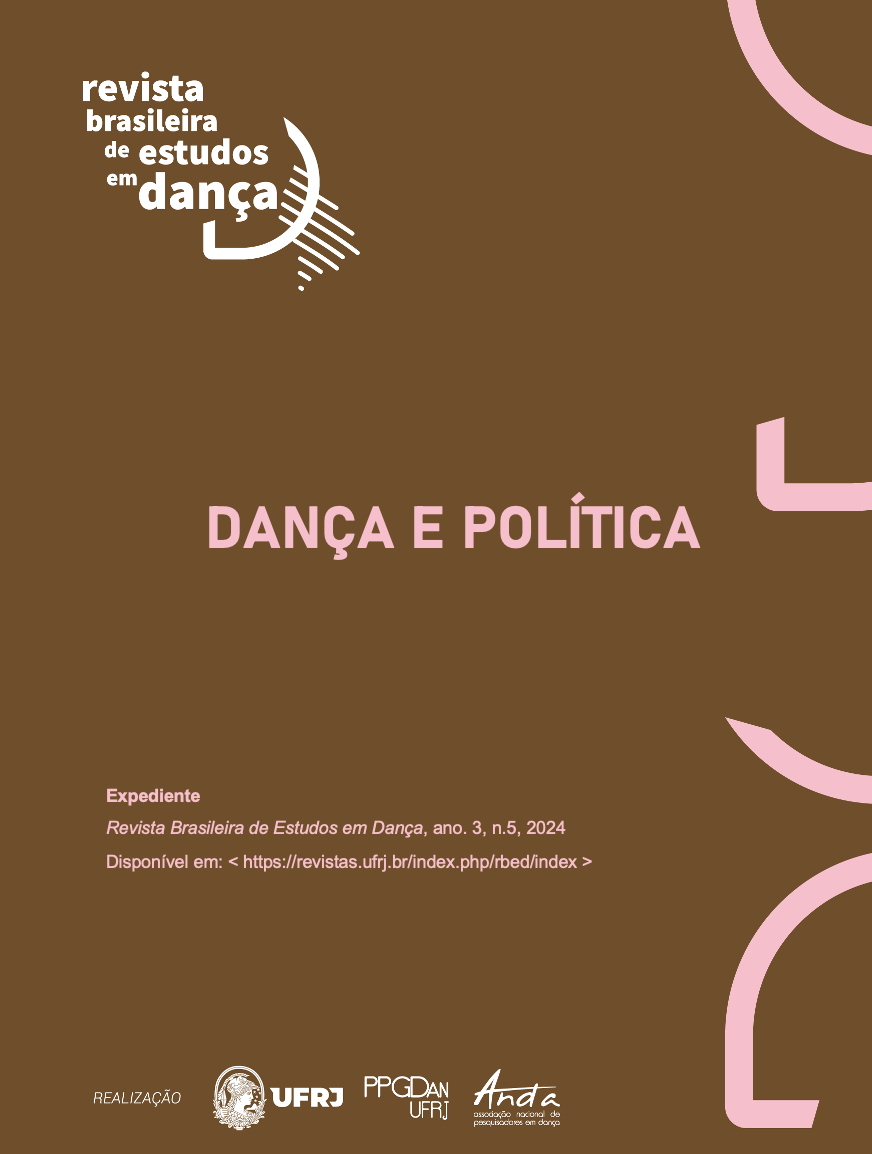Dancing to become a subject: how migrants empower themselves through cultural practices
DOI:
https://doi.org/10.58786/rbed.2024.v3.n5.63895Abstract
This article arises from my research on being a migrant and the reflections raised by the video art Você quer saber mais de mim? [Do you want to know more about me?], a work I made in 2023 using recordings of a performance in São Paulo by the Colombian dance collective Prende la vela of which I have been a part since 2018. Considering the perspective and agency of the subject, it is possible to see the dance experience as an opportunity to manifest cultural identity, a powerful place not only for visibility and preservation of memory but also for resistance and cultural reaffirmation. In the case of migrants, this becomes essential when considering the different forms of silencing to which we are subjected when considering the conditions of our civil, political, economic, and social rights in Brazil.
References
ALCOFF, Linda. The problem of speaking for others, Cultural Critique, n. 20
(Winter, 199l-1992), 5-32. Disponível em: <https://blogs.baruch.cuny.edu/digitalcombishop/files/2016/03/AlcoffProblemSpeakingForOthers.pdf>. Acesso em jan/2024.
BONA, Dènétem Touam. Cosmopoéticas do Refúgio. Florianópolis: Cultura e Barbárie Editora, 2020, p. 46.
CANCLINI, Néstor García. Culturas Híbridas. São Paulo: Editora da Universidade de São Paulo, 2019.
CLETO, Juliana. Implicações do direito ao voto aos imigrantes: ameaça à soberania nacional ou efetivação de um direito fundamental?. Revista brasileira de políticas públicas. v.5, n.3, jul-dez/2015. Disponível em: <https://www.publicacoes.uniceub.br/RBPP/article/view/3491>. Acesso em jan/2024.
COHEN, Nilen. Você quer saber mais de mim?. Vimeo, dez/2023. Disponível em: <https://vimeo.com/886850437>. Acesso em dez/2023.
DE LIMA, Marcelo. Um imigrante iguala-se realmente a um cidadão nacional, em direitos civis, políticos, econômicos e sociais? O direito comparado: modelos brasileiro e europeu. Revista de Informação Legislativa. a. 49, n.193, jan-mar/2012. Disponível em: <https://www2.senado.leg.br/bdsf/bitstream/handle/id/496573/000940665.pdf?sequence=1&isAllowed=y>. Acesso em dez/2023.
KILOMBRA, Grada. Memórias da plantação: episódios de racismo cotidiano. Rio de Janeiro: Cobogó, 2019.
KRAUSS, Rosalind. A escultura no campo ampliado. Revista Arte & Ensaios. v.17, n.17, abr/2022. Disponível em: <https://revistas.ufrj.br/index.php/ae/article/view/52118>. Acesso em dez/2023.
MACEDO, Vanessa. O autodepoimento na cena como prática feminista. In Souza. Marco & Carvalho Carla (org). Arte e Estética na Educação: corpos plurais. Curitiba, CRV, 2022. p. 39-53.
RIBEIRO, Djamila. Lugar de Fala. São Paulo: Editora Jandaíra, 2019.
TOURINHO, Lígia; MITKIEWCZ, Luciana. Bonecas Quebradas. Rio de Janeiro: Azougue, 2016.
TURRIAGO, Anamaría Vargas. Bailar es nuestra revolución”: dança e cultura popular em um coletivo de jovens imigrantes em São Paulo. Dissertação (Mestrado em Ciências Sociais) - Programa de Estudos Pós-Graduados em Ciências Sociais da Pontifícia Universidade Católica de São Paulo, São Paulo, 2022. Disponível em: <https://tede.pucsp.br/handle/handle/27819>. Acesso em dez/2023.
Published
How to Cite
Issue
Section
License
Authors who publish in the Revista Brasileira de Estudos em Dança are
responsible for the content of signed articles and retain copyright.
They grant the journal the right of first publication with the work simultaneously
licensed under the Creative Commons Attribution-NonCommercial 4.0 License
(Open Archives Initiative - OAI). This feature, used for open-access journals,
allows sharing work for non-commercial purposes and acknowledges
authorship. If the text is later published in another vehicle, the author
must inform that it was initially published as an article in the Revista Brasileira
de Estudos em Dança. Therefore, even if the journal owns the first publication,
authors are entitled to publish their work in institutional repositories or on
their personal pages, even if the editorial process has not been completed.
The journal reserves the right to make normative, orthographic, and grammatical changes to maintain the language standard, respecting the authorial style.

